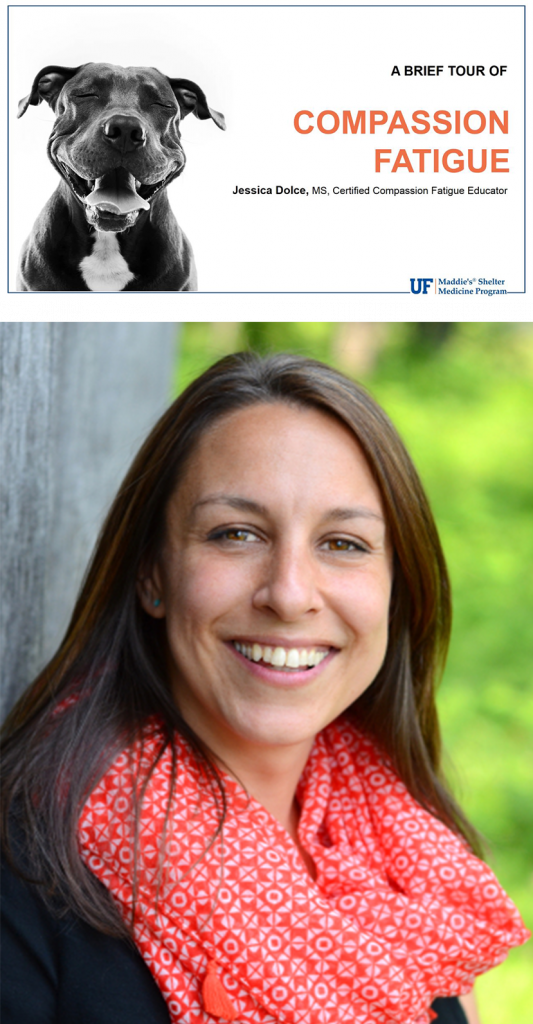Module 9: The Role of the Shelter Veterinarian
Compassion Fatigue
Euthanasia is sometimes the most humane option for particular animals in shelters. Not every animal can be saved with the resources available. Making decisions about which pets should be euthanized, and performing euthanasia, takes an emotional toll on shelter staff. Such distress is challenging to recognize, as well as to manage. Signs of emotional distress stemming from euthanasia duties include: anger, frustration, depression, guilt, sadness, grief, shame, and/or isolation, among others. Over time, the emotional burden may manifest in extreme reactions, including but not limited to: clinical depression, anxiety, substance abuse, sleeping disorders, significant changes in eating habits with weight gain or loss, emotional detachment/withdrawal, and even thoughts of suicide. In some cases, a strong sense of work dissatisfaction or alienation accompanies the distressed emotional state. In this case, a negative attitude, absenteeism, or careless or callous handling of animals may accompany the psychological state of fatigue.
Watch This

A decade ago, many shelters in the US were euthanizing far more animals than they saved. Listen as a shelter staff member describes what it was like work in such emotionally draining conditions [4 min]. Often missing from the discussion about the merits of animal lifesaving and animal welfare in shelters is awareness of the impact of euthanasia and animal suffering on the staff and volunteers who care for the animals. Like veterinarians, they too are at high risk for compassion fatigue, burnout, and moral distress. An often overlooked benefit of improved shelter lifesaving and operating within capacity for care is the joy it brings to animal caregivers.
Compassion fatigue is not limited to personnel involved with euthanasia. Anyone who works in an animal shelter is a candidate for experiencing it. Veterinarians working in animal shelters must be prepared to recognize compassion fatigue in those around as well as in themselves. To succeed long term, they must be prepared to develop positive coping strategies that enable them to maintain a healthy emotional balance.
Like animal sheltering, the field of veterinary medicine is physically demanding and emotionally challenging. These challenges can be especially overwhelming in the context of shelter medicine. This is because veterinarians working in shelters are often tasked with extremely difficult decisions on a daily basis. Nonetheless, they must maintain focus and continue moving forward, often in the face of both internal and external conflicts, as one decision is made and the next decision or task is undertaken.
Experience does not make shelter veterinarians or workers immune to the stresses involved in day-to-day animal sheltering. Compassionate caregiving requires sustained energy and resilience. Without effective coping skills and adequate support, the effects of compassion stress and fatigue over time can compromise employee health, wellbeing, productivity and animal welfare. Always remember: We owe it to ourselves–and to the animals–to take care of ourselves so that we can continue the vitally important work of animal sheltering.
Shelter Medicine Program at the University of Florida offers a course specifically designed to support people who work with animals. Compassion Fatigue Strategies helps participants recognize signs and symptoms of compassion fatigue, learn to manage stress levels and increase self-care practices, connect with the rewards of the work, build resiliency, and commit to making successful changes in one’s life and organization. This class is a personal exploration to help build the self-awareness necessary to manage the impact of compassion fatigue. By the end of class participants will have six strategies to help manage and transform their experience with compassion fatigue, a personal mission statement and goals to help make lasting changes, a better understanding of oneself and how to engage in self-care that works.
Watch This

Working in Shelter Medicine brings a lot of intrinsic rewards. Saving animals, especially those who have been homeless, neglected, or abused, is intensely satisfying. At times, however, the weight of this responsibility, combined with the seemingly endless need, can lead to distress. Have you or someone you know experienced compassion fatigue? Listen to this presentation A Brief Tour of Compassion Fatigue by Jessica Dolce about ways to prevent, recognize, and manage compassion fatigue in animal welfare work [15 min].
Jessica Dolce is a Certified Compassion Fatigue Educator via the Figley Institute and participates in ongoing training via Tend Academy and the International Association of Trauma Professionals. She teaches compassion fatigue classes online and around the country to help animal care and welfare professionals be well, while they do good work. Jessica brings fifteen years of experience working with and for companion animals to her classes. Her project, Dogs in Need of Space, provides support to dog owners and animal care professionals around the world. Jessica received her Master of Science in Adult and Higher Education degree from the University of Southern Maine and holds certificates in mindfulness facilitation and positive psychology coaching. She can be found online at www.jessicadolce.com.

